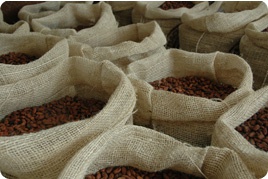 File photo
File photo
Some cocoa licenced buying companies (LBCs) have called on the Ghana Cocoa Board (COCOBOD), the industry regulator, to reconsider its decision to accept seed-fund guarantees from only universal banks.
COCOBOD on January 16, 2014 issued a directive to all LBCs that it will not accept guarantees issued by non-bank financial institutions, as well as insurance companies, for cocoa purchasing operations with effect from January 16, 2014.
The directive is said to have been informed by the default rate among some of the small-scale LBCs with guarantees from non-universal banks.
COCOBOD sources syndicated loans from the international finance market, and then local financial institutions guarantee seed funds for the LBCs to enable them procure cocoa beans for onward export through the COCOBOD.
But the most affected LBCs, who have formed the Progressive Licenced Cocoa Buyers Association (PLCBA), say the new directive threatens their very existence and will erode gains made in the cocoa sector over the years.
The PLCBA, which is made up of 14 members, accounts for about 10 percent of the cocoa beans purchased from the farmers.
Samuel Anane, President of the Association, told the B&FT that even though some of their members default in paying COCOBOD, the situation is not different from that of bigger LBCs which do business with banks.
“We do feel sidelined by COCOBOD. The banks are shying away from giving us guarantees because of the default levels of some of our members, but the banks must consider restructuring the debt of some of our members,” he said.
He said that the cocoa targets were not met last year, due largely to the directive.
But COCOBOD is standing by its decision to accept guarantees from only credible commercial banks -- even though the central bank stepped in to speak on behalf of some of the non-bank financial institutions (NBFIs).
Noah Kwesi Amenyah, Public Affairs Manager COCOBOD said: “COCOBOD has taken a loan that needs to be paid back, and the money must be used for its intended purpose of purchasing cocoa beans; no LBC should use that money for any other activity, because if you do so and cannot account for the money, then we can fall on your guarantors who should be in a position to pay,” he said.
Mr. Amenyah added that if the aggrieved LBCs are credible enough, they shouldn’t find it difficult securing guarantees from the banks. “This sends a signal that they are not credible enough for the commercial banks to give them guarantees,” he added.
Mr. Anane suggested that COCOBOD ought to take a critical look at the problem’s root-cause, which is mainly due to the current payment system that gives room for purchasing clerks and district officers to delay payments to farmers.
“Even if the banks in the country can issue guarantees for seed-funding, is cocoa the only sector that banks do business with? Therefore, all other non-bank financial institutions can come in and help,” he said.
Dr. Nii Kotei Dzani, Chief Executive Officer of Ideal Finance, added that traditionally it is these sidelined NBFIs which support SMEs in this economy.
“Our economy is agro-based but commercial banks do not look at the agricultural sector; rather, it is these NBFIs that are working hard to support the SMEs. Over 90 percent of credit from banks end up with multinationals or large corporations, because the risks with lending to these firms are low.
“We the NBFIs therefore take the risk to lend to small companies whose credibility cannot be vouched for. COCOBOD must reverse this decision to safeguard the progress the country has made in terms of cocoa production. One of the reasons why we performed poorly in the cocoa sector last year is because of this directive. Most of these LBCs cannot raise guarantees from the banks,” he said.
He believes it is about time the industry began to appreciate the role of NBFIs in this economy. “Sometimes they get it wrong by putting all of us under the umbrella of microfinance. I know the central bank is working hard to reverse this situation,” Dr. Dzani said.